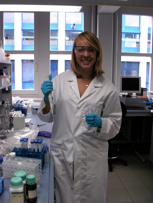
University:
Major:
Site Abroad:
Mentor(s):
Faculty Sponsor(s):
Project Title:
Project Description:
Nanoparticles are included more and more frequently in biomedical applications, new technology, and household products such as cosmetics and sunscreens. However, little is known about their biological impact. Nanoparticles exhibit size-dependent properties due to their high surface area-to-volume ratio and are potentially more reactive than bulk materials. Many nanoparticles are small enough to pass through cellular or nuclear membranes, where they have the potential to agglomerate or cause conformation (and possibly functional) alterations in proteins and other biological molecules that adhere to the particle surface. My project focused on the effects of nanoparticles on the activity of the model enzyme beta-galactosidase and on the adhesion of various biological molecules to silica nanoparticles. Beta-galactosidase is a hydrolase enzyme that, in these experiments, catalyzes the hydrolysis of ONPG to galactose and ortho-nitrophenol, a yellow compound which can be measured by its absorbance at 420 nm. After determining the appropriate experimental parameters, both silver and silica nanoparticles of various sizes were added to the assay to measure any inhibition of enzyme activity. I also investigated the adhesion of bovine serum albumin (BSA), pure bovine serum, histone, and DNA to 25 nm silica nanoparticles. The particles were incubated with the protein or DNA and then centrifuged to separate free molecules from molecules that had adhered to particles. Protein concentration was measured using a bicinchoninic assay and DNA concentrations were measured with an absorbance spectrophotometer. Understanding the interactions between nanoparticles and biological molecules or reactions is imperative for the development of consumer nanoproducts in the future.
